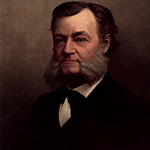
George Shiras, Jr. (1892-1903)
George Shiras, Jr. lived from 1832 to 1924.
Early Life and Legal Career
Shiras was born in Pittsburgh, Pennsylvania on January 26, 1832. He attended Ohio University and Yale College, graduating from Yale in 1853. Shiras then enrolled in Yale Law School, but left before earning his law degree. He instead completed his legal training by reading law at a law office. Shiras began practicing law in Dubuque, Iowa, before moving his practice to Pittsburgh, Pennsylvania. In Pittsburgh, Shiras represented large industrial clients and became a prominent corporate attorney.
Appointment to the Supreme Court
On July 19, 1892, Shiras was nominated to the Supreme Court of the United States by President Benjamin Harrison. Although he had nearly forty years of legal experience at that time, Shiras had very little public service experience.
Shiras’ method of interpretation on the bench depended heavily on precedent and conventional rules. During his ten-year tenure, he authored 253 majority decisions and 14 dissenting opinions. However, Shiras is noted for his votes on just two landmark cases: Pollock v. Farmers’ Loan & Trust Co. and Plessy v. Ferguson. In both cases, he sided with the majority. In Pollock, Shiras voted to strike down the Income Tax Act of 1894, believing it to be unconstitutional. This ruling led to the need for a constitutional amendment to impose a federal income tax, and in 1913, the Sixteenth Amendment to the United States Constitution was ratified. In Plessy v. Ferguson, the Court upheld racial segregation under “separate but equal.” That decision, however, was overruled in 1954. Shiras retired from the bench on February 23, 1903 at the age of 70.
Death
Shiras remained in retirement until his death in Pittsburgh in 1924.
Notable Cases
Pollock v. Farmers’ Loan & Trust Co. (1895)
Plessy v. Ferguson (1896)







